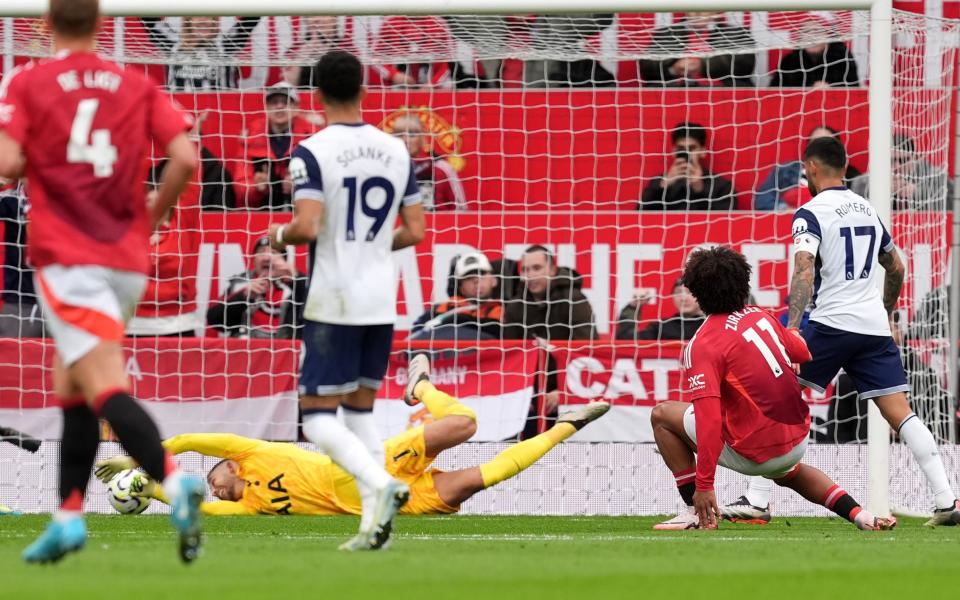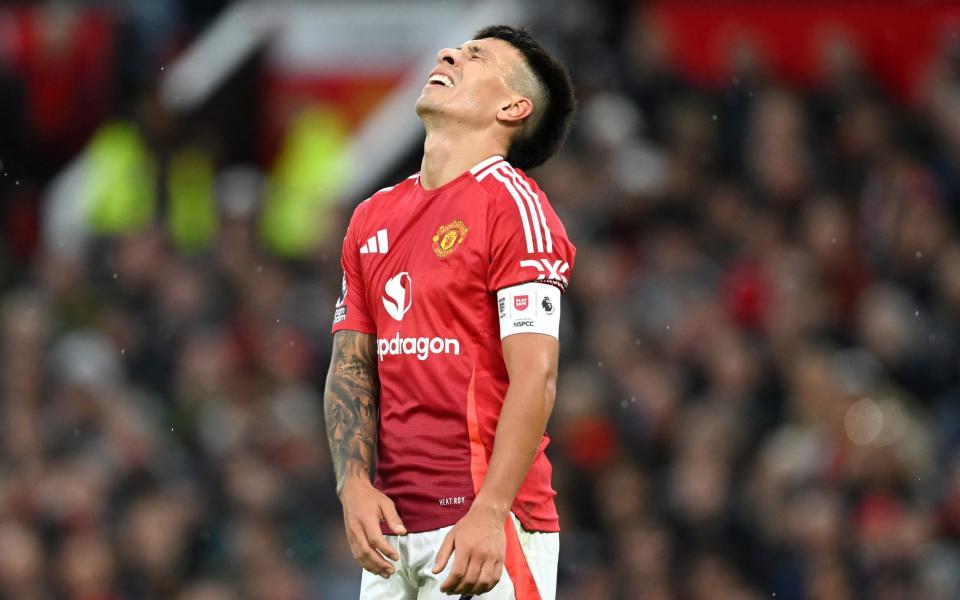Erik ten Hag’s five key failings that put Manchester United job at risk

Erik ten Hag is facing a defining week at Manchester United after Sunday’s shambolic 3-0 defeat at home by Tottenham piled on the pressure ahead of trips to Porto and Aston Villa. Telegraph Sport analyses some of the factors behind the mess that has left the Dutchman again fighting for his job.
Failure to score goals
Only newly promoted Southampton have scored fewer goals than United’s five in six Premier League matches this season. Even basement club Wolves have managed one more. But the lack of goals is not a new problem: it has been staring a toothless United in the face from the moment Ten Hag arrived as manager almost two-and-a-half years ago and nothing substantive enough has been done to address it.
United were the joint-lowest scorers in the Premier League’s top 10 last term with 57 goals - one fewer than they managed in the previous campaign - and ended the season with a negative goal difference. In truth, United are still haunted by decisions that pre-date the Ineos era at Old Trafford. Overspending so grossly on the £85 million misfit Antony 12 months before lavishing £60 million on Mason Mount was a chronic misuse of funds that could have been directed towards landing England striker Harry Kane from Tottenham. Instead, United settled on the inexperienced Rasmus Hojlund for a whopping £72 million last year and this summer brought in Joshua Zirkzee from Bologna for £36.5 million, but the reality is the team are still without a proven goalscorer who can handle the burden of leading the line at one of the world’s biggest clubs.
The situation has been compounded by the collapse in Marcus Rashford’s form over the past year, the lack of a consistent goal threat in wide areas generally and the absence of any real patterns of play in attack.
United can be effective on high-speed transitions but often look woefully short of ideas against opponents who sit in. Midfielder Scott McTominay was United’s third-joint top scorer last season with 10 goals, but he was sold to Napoli this summer to raise funds to sign Manuel Ugarte, in part because the club could not offload Casemiro. Beyond captain Bruno Fernandes, who has yet to score this term and is now facing a potential three-match ban after his red card against Tottenham, there are also not enough goals from midfield.

‘They look an uncoached football team’
United have shipped at least three goals in eight of their past 29 matches dating back to the start of February. The statistics at Old Trafford make for even grimmer reading. In their last 28 home outings, starting with Brighton in September last year, United have conceded at least three goals on eight occasions. Teams with a sound defensive structure and any hope of competing for the biggest honours do not ship that many goals that frequently. Their poor shape and lack of compactness out of possession have been enduring fault lines under Ten Hag and have habitually left United vulnerable to being run at and overloaded - and individual mistakes have been punished more severely than is often necessary.
“Some of the positions people take up on the pitch is just madness at times,” former United midfielder Paul Scholes said on Optus Sport after the Spurs debacle. “They look an uncoached football team.”
A lightning fast start from Tottenham ⚡
Micky van de Ven with an unbelievable run and he makes no mistake putting it on a plate for Brennan Johnson 💥 pic.twitter.com/8KubHjAm2U— Sky Sports Premier League (@SkySportsPL) September 29, 2024
FC Twente’s equaliser in the Europa League on Wednesday and Tottenham’s first goal - when defenders were allowed to run huge distances forward unchecked past a flurry of red shirts to set up goals - were cases in point. Casemiro’s misjudgment in the build-up to Tottenham’s second goal instantly left Spurs two-on-one against Lisandro Martinez because Diogo Dalot was in no man’s land. Against Liverpool, mistakes by Casemiro and Kobbie Mainoo swiftly invited 5-v-3 and 4-v-2 attacks with giant spaces for opponents to exploit.
"For them to run through the heart of your team, for me it's a huge system error."
Breaking down FC Twente's second-half equaliser against Man United 👀
🎙 @julesbreach pic.twitter.com/3rD1PHX4rZ— Football on TNT Sports (@footballontnt) September 25, 2024
Such disorganisation combined with a poor work rate and lack of urgency and hunger are routinely undermining United. But it is not even as if they are secure when they have numbers back. Too often players are guilty of ball watching to great cost: take Brighton’s 95th-minute winner when eight players were fixated on Simon Adingra and completely unaware of the three unmarked players at the back post, including the goalscorer Joao Pedro.
Brighton may well have grabbed the winner in the dying minutes 🔥 pic.twitter.com/hM3KqavC5p
— Football on TNT Sports (@footballontnt) August 24, 2024
Inability to play out from the back
More than £600 million has been spent on Ten Hag’s watch, he has a host of his former Ajax players at his disposal, including three defenders and a goalkeeper, and yet United are unable to play out from the back with any sense of cohesion or conviction - and certainly not by comparison to any number of Premier League rivals.
The unease around Old Trafford when they try is palpable. It was evident even before Spurs scored their quickfire first on Sunday. A short pass by Andre Onana to Dalot was poorly controlled and left the panicked United defender, with Dejan Kulusevki advancing, stretching to rush a pass to Martinez, who hacked the ball away under pressure from Brennan Johnson straight to the Spurs right-back Pedro Porro. Ten Hag’s United reign is littered with moments like that and raises the question: what do they do on the training pitch?

Unidentifiable ‘game model’
“You don’t know how they’re going to play, you don’t know how they are going to approach games,” Scholes said. “Are they going to counter-attack, sit deep, are they going to try to have all the possession? We’ve no idea. We’re two and a bit years in now. Of course we should know by now. I think whatever happens, happens and he [Ten Hag] just takes it.”
Ten Hag is into his third season and United fans are still no nearer to understanding what the playing philosophy and identity is supposed to be. Scholes believes the players are just as confused. “They looked [against Spurs like] ‘I don’t know what to do’.”
The Dutchman has talked about creating the best transition team in the world, but there is nothing coherent about the way they attack or defend.
Outside ‘noise’ compounding their anxieties
“Hated, adored, never ignored” goes the saying by United supporters. You can almost hear the drum roll every time United lose a game. There is no club in the country - and few others in the world - where a poor performance or defeat invites such a deluge of criticism, with past players and pundits or a combination of the two lining up to offer their opinions or latest withering assessments. The past decade has felt like one long soundtrack of despair from Gary Neville, Roy Keane, Scholes and co, and many United players - and managers for that matter - have found it difficult to cope with such unrelenting scrutiny in the Old Trafford goldfish bowl. Ten Hag and the current squad are no different, but being able to deal with the persistent noise in this unsparing social media age is now crucial.

 Yahoo Sport
Yahoo Sport 




































































